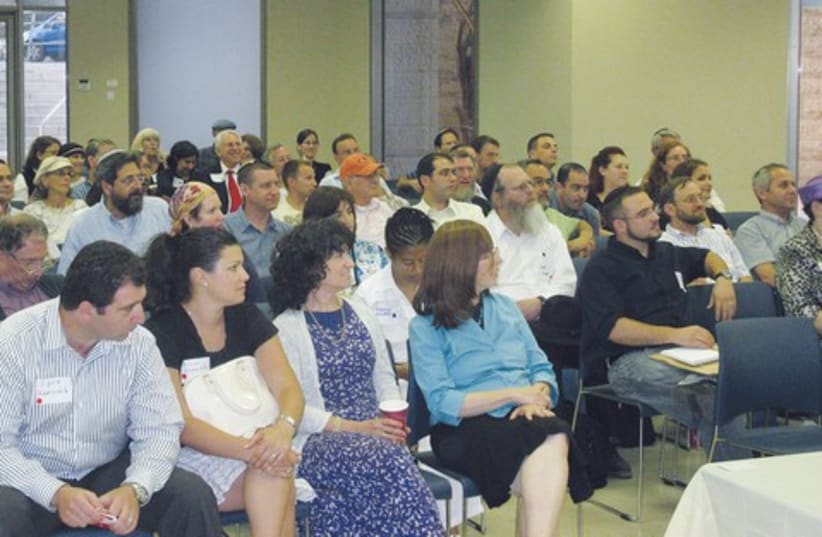Every Thursday morning, a group of 25 small business owners roll out of bed so that they can make it to a meeting with colleagues on whom they rely to help maximize their profitability and increase their portfolios. The weekly gathering at a retirement home in Herzliya Pituah is presided over by Alan Gold, a British expat whose immigration to Israel has only been enhanced by his leadership role as the chairman of the only English-speaking branch of Business Networking International. “Networking is as old as the sun,” said Gold, a London native who made aliya two years ago. “I’m sure that the Phoenicians and the Romans all networked.”
The organization is an international conglomerate that has grown into a smashing success, providing business owners from all spheres of work with a forum to create contacts and a system of support from other entrepreneurs by exchanging referrals. “In BNI, they don’t meet their competitors,” Gold said. “They only meet their collaborators. Each chapter only allows one person per category.
It means that you can have a situation where 25, 30 people are carrying business cards around and acting as your public relations people, 24 hours a day, seven days a week, 52 weeks a year. You won’t have to pay them commission, you won’t have to pay them sick pay, you wouldn’t have to pay for their light and heat and travel. They’re all doing this for you, and you’d be amazed at how people will go out of their way to help each other out.”
Gold is a networking veteran, having founded and nurtured a number of successful chapters in England. But after he arrived in Israel, he felt that his Hebrew was not fluent enough to manage a chapter on his own. That was when the company decided to experiment with a chapter that would manage its affairs and hold meetings exclusively in English. Since the pilot was introduced last year, it has proved a considerable success.
“It was formed to be a meeting place for three kinds of people: olim hadashim [new immigrants], olim vatikim [long-time immigrants] from English-speaking countries and Israelis who speak reasonable English,” Gold said. “It was not meant to be a ghetto just for olim, and it has proven to be so already because our membership is a cross-section of all those kinds of people. All the people coalesce and merge completely happily. There are no cliques one way or another.”
The meeting begins with each member offering a one-minute sales pitch that is designed to heighten interest in his or her business. Afterward, members take turns offering referrals to their colleagues, each of whom is the only representative of a particular occupation or line of work. That way there is no fear of competition from members selling the same product. In effect, each member becomes a sales representative for their colleagues, providing access to each other’s contacts whenever they are in need of services.
The company’s 45 chapters in Israel have proved to be a boon for their membership. Last year, the chapters generated NIS 61.2 million by their wordof- mouth referral system.
“[When] the big corporations want to get business, they can afford to do advertising with radio and television, the media, whatever,” Gold said. “A small person doesn’t have the budget to do that, therefore if you can get business without having to take part in [all of that] and instead get recommendations; that’s always the best form of business.”BNI’s “Anglit” (English-language) chapter stands out from other groups in that it gives Englishspeaking immigrants looking to do business a soft landing spot once they are forced to promote their products in Israel.
“It is certainly intended so that people like me who have come from the gola [Diaspora] quite recently can basically find a setting where they can do business without the problem of language,” Gold, a copywriter by trade, said. “It’s one thing to be able to pick out a conversation in Hebrew and find out the way to somewhere or buy something in a restaurant or a shop. But when you want to get sophisticated ideas about your business over, it’s very hard until you are really fluent.”
“There are a lot of [Anglo immigrants] who have been here for many years, and although they can take part in a conversation [in Hebrew], they are much more relaxed and happy doing so in English,” he said. “It fills a very important need.”
Pamela Levene is an English-language tour guide who joined the chapter earlier this year. A former secretary and translator with the government negotiating team that drew up the Oslo Accords in the early 1990s, Levene said that the BNI chapter has forced her to hone her business-promoting skills, an area that she had long neglected.
